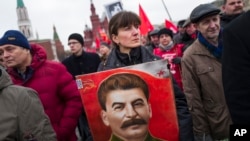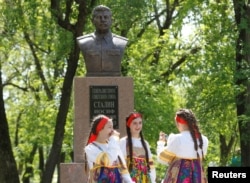Historians generally agree that Josef Stalin was a dictator who killed and terrorized millions of people through a repressive police state. However among Russians, there are signs that people are starting to see him more as an "effective manager" and a symbol of Soviet-Russian power.
According to a poll by the state-backed VTsIOM polling agency, the results of which were published on July 20, "more than half of Russians (62 percent) agree with the view that plaques, busts, [and] paintings that talk about the success of Stalin should be put in public places; on the other hand, 65 percent of the citizenry is against erecting signs talking about his failures and crimes."
Seventy-seven percent of respondents aged 18-24 years supported such Stalin memorials, while 63 percent of respondents 60 years and older favored them.
Forty-two percent of respondents said they would favorably view the placing of signs memorializing Stalin on neighboring apartment buildings, while 21 percent said they would view that negatively and 33 percent said they would not view it neither positively nor negatively.
The poll was conducted in early July. Around that same time, Lev Gudkov, director of the Levada Center, Russia’s only independent national polling agency, told VOA’s Moscow bureau that support for a dictatorship was growing among Russians.
Russia’s attitude toward Stalin is reflected by Russian state propaganda and pro-Kremlin public figures. Commenting on the results of the VTsIOM poll, Mikhail Leontiev, press secretary of the Russian state oil company Rosneft, told the Komsomolsakaya Pravda newspaper: “Stalin, in the eyes of the people, personifies Russia’s power. And that’s true whether we like it or not. And there is a demand for power in this country. And it must be met.”
Stalin led Russia from the mid-1920s until his death in 1953. His tenure was marked by the extreme measures he took to purge opponents and consolidate power.
But he also led Russia through World War II and crafted strategy to back pro-Soviet political parties abroad, establishing the Soviet Union as a superpower and rival of the United States. There are signs that more people now are focusing on those aspects of his rule.
Young supporters shaped by propaganda
VTsIOM, judging by statements made by its head, Valery Fyodorov, is completely loyal to the Russian president. Fyodorov recently told Russia’s independent TV Dozhd that critics of Vladimir Putin are people “who have no love for our country who have no desire to make it better."
Still, while experts interviewed by VOA’s Moscow bureau said there is no reason to doubt VTsIOM’s poll results, one of them said the results are not necessarily a sign of support for Russia’s current leadership.
Russian political analyst Dmitry Oreshkin told VOA that “there really is very great sympathy for Stalin” among young Russians up to the age of 25, but that it represents a kind “mental rebellion” against the status quo.
“They are not happy with what is happening now, but are not ready to listen, for example, to [liberal politician Grigory] Yavlinsky, because they have in their heads a kind of horror of the 1990s formed by propaganda, which also formed a perception of the Soviet Union as a great power that everyone feared and respected, above all under Stalin,” he said. “At the same time, they cannot even imagine there being stores with empty shelves, as it was in the Soviet Union; they just don't believe it. Stalin, in their view, is an alternative to what is happening now."
Such sentiments are "a direct consequence of Russian state propaganda and the system of values that Putin successfully installed in Russian minds over the past 15 years," Oreshkin said. However, such views of Stalin create an “imaginary alternative” to the status quo and are thus disadvantageous to the Kremlin, he added.
“They are openly saying on the Internet that Stalin would not have given up the Donbas [region of eastern Ukraine], that Ukraine would be conquered – that is, [Stalin] would have done what Putin decided not to – and thus they are creating a kind of virtual opposition to Putin,” Oreshkin said.
He added: “Sooner or later, ‘young officers’ who think the same way will appear and, with a decline in the economy, they may want to change everything by force.”
Creeping re-Stalinization
The opposition politician and historian Vladimir Ryzhkov agrees that a campaign to whitewash Stalin has been launched under Vladimir Putin.
“During perestroika and the ‘90s, the government's attitude to Stalin was unequivocally negative,” he said. “Mikhail Gorbachev was the first to guide through the [Soviet] Politburo a decree condemning Stalin’s terror and calling him a criminal. And Boris Nikolaevich Yeltsin, whose parents were arrested [under Stalin], unequivocally viewed Stalin as a criminal. And in 2000, a creeping re-Stalinization gradually began, and more and more pseudo-historical films, in which Stalin and [his secret police chief Lavrenty] Beria didn't look like a monsters, began appearing.”
Ryzhkov noted that Russian history textbooks approved by the government a few years ago characterize Stalin’s “Great Terror” of the 1930s as "violations of the principles of socialist democracy.”
“This is part of a rather subtle government policy to gradually launder the criminal,” he said.
Unlike Oreshkin, Ryzhkov believes the rehabilitation of Stalin benefits the Kremlin.
"Stalin's model is that of a military camp, a mobilized country,” in which the authorities can also blame “their lack of control” on “a hostile external environment,” he said.
“In this model, it is possible to spend money on anything, including on personal enrichment, and to inflate the military budget, paying money to those who protect the government,” Ryzhkov said.





